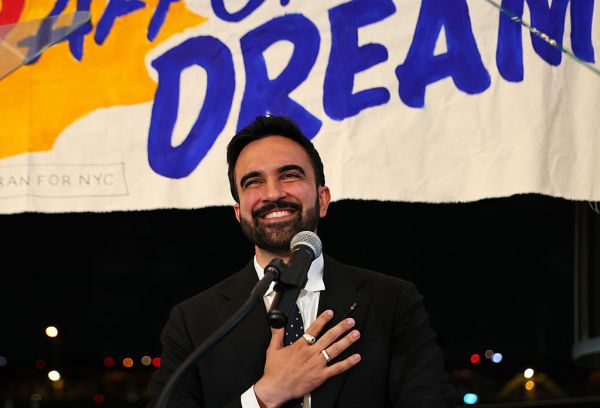To Generation Z, there may be few things worse than traditional sexual mores. Gallup reported last year that “more than one in five Gen Z adults … identify as LGBTQ+.” While certain respondents identified specifically as lesbian or gay, many of those in the umbrella category had more enigmatic answers. Gallup notes that “respondents who volunteer another identity (e.g., queer; same-gender-loving; pansexual) … are included in the LGBTQ+ estimate.”
Even young people who don’t self-identify as gay or the more encompassing term “queer” are increasingly embracing other ways to define their sexuality and romantic goals. Wanting to be a father or mother, for example, is out. Having a “breeding kink,” however, is in.
“I was talking to some Gen Z the other day, and she’s like, ‘I have a breeding kink,’” said the singer Grimes in a recent interview with Time. “And I’m like, I think you might just want to get married and have kids. That was normal until pretty recently.”
In fact, kinks are everywhere. One of the most popular songs by Gen Z pop darling Chappell Roan is titled “My Kink is Karma,” and one line goes: “People say I’m jealous, but my kink is karma.” Social media is also rife with kinkification: “My ultimate sexual fantasy is to annoy a man so much that he falls in love with me,” reads one post on X with more than 130,000 likes.
Media outlets and groups such as the American Psychological Association have even codified the pursuit of deep romantic attraction as its own sexual orientation: demisexuality. (In Merriam-Webster’s words, this means “feeling sexual attraction towards another person only after establishing an emotional bond with that person.”) The term has become colloquial: Tinder users have long been able to identify as demisexual, and the word has appeared in headlines everywhere from Cosmopolitan to the BBC.
“I’m proper guarded,” explained English singer Tulisa, who adopted the label last year. “I feel like I’m demisexual, I need to have a really close emotional bond with someone. … I need actual depth. I’m a slow, slow burner. I’ve been celibate for over three years.”
In other words, a demisexual is a person who values an emotional connection as much as sexual chemistry. It’s a new-ish word, but, as readers might guess, the idea is not so revolutionary. Nathan Schlueter, a professor of philosophy and religion at Hillsdale College, suggests that terms such as “demisexual” are actually just “superficial versions of much richer expressions that can be found in a tradition that Gen Z has been deprived of thinking about by our culture and education system.” Yet outlet after outlet celebrated Tulisa’s admission, with many even offering up first-person narratives from self-proclaimed demisexuals.
But not everyone is jumping on the bandwagon. “We used to call people who needed to feel a strong emotional bond before wanting to f— someone people who, you know, needed to feel a strong emotional bond before wanting to f— someone,” seethed advice columnist Dan Savage back in 2017. “But a seven-syllable, clinical-sounding term that prospective partners need to Google—demisexuality—is obviously superior to a short, explanatory sentence that doesn’t require internet access to understand.”
When you read accounts of self-identified demisexuals, they usually frame their experiences as beginning with a dissatisfaction with dating apps and hook-up culture. “I saw all my friends getting with strangers,” one young woman told Refinery29. “The idea of touch with someone I didn’t know didn’t feel particularly appealing.”
She is certainly not alone. We know Gen Z is not particularly sexually active, and the celibacy movement has grown so popular that the dating app Bumble’s attempt to shame women for not having sex spectacularly backfired. Despite what many young singles may think, there are plenty of people looking for marriage and monogamy; they’re just afraid of employing straightforward language to justify their desires, lest it imply that they’re “traditional.” Better to dress up those desires as kinks instead.
“I think people are pretty spiritually lost,” Grimes told Time, in an attempt to explain the existence of the so-called breeding kink, “and a lot of people are filling this need for moral authority with politics, which is leading to a lot of chaos, in my opinion.”
After 80 years of the sexual revolution and its aftermath, young women (and men) have been given plenty of reasons to say yes to casual sex, but fewer reasons to say no. Even a casual date can come with the expectation of sex. “With sex generally understood to always be on the table and the etiquette around it unclear,” writes Christine Emba in her 2022 book Rethinking Sex, “genuinely low-stakes, positive encounters feel more and more out of reach.” At least, if you have “demisexual” in your dating bio, your date knows an immediate hook-up probably won’t be happening.
There are few options left for young people who are uninterested in the nothing-but-sex encounters author Erica Jong branded as the “zipless f—.” They can opt out of sex entirely, embracing the suddenly trendy shift toward celibacy. One popular celibate celeb is Julia Fox, who, perhaps not coincidentally, briefly dated Ye (Kanye West) before beginning her celibacy journey.
For those who want to date, there is little cultural cachet to be found in throwing around conservative-coded words such as “monogamy” or “marriage”—unless, of course, you add the word “kink” to the end. If you’re the type of gal who at least wants to know a guy’s middle name before jumping in bed with him, you can call yourself “demisexual” so you don’t come off as a prude.
Our foremothers fought for the right to have casual sex, but that freedom came with consequences. As the author Louise Perry writes in The Case Against the Sexual Revolution, “The sexual revolution has not freed all of us, but it has freed some of us, and selectively, and at a price.”
Now, young people are reckoning with that price: expected sex that it is often ungratifying and socially difficult to reject. But the tide is shifting: Celibacy is in, the consent ethic has grown stale, and it’s more okay to say that casual sex isn’t as empowering as we were promised. Of course, you may have to use the proper jargon. The millennial woman had to prove that she was sexually adventurous; see various episodes from the sitcom New Girl for examples. The Gen Z woman, on the other hand, doesn’t always need to say yes; she just has to find moral authority for her “no” in politically approved sexual terms.
Gen Z will benefit from its search for a new sexual ethic, even if the result is seemingly buried in queer theory jargon. Maybe the first step is justifying innate romantic and sexual desires in the language of the movement that once sought to quell them. Next, perhaps, Gen Z will discover how monogamy, marriage, and parenthood can be unapologetically justified for their own sake—and on their own terms.









Please note that we at The Dispatch hold ourselves, our work, and our commenters to a higher standard than other places on the internet. We welcome comments that foster genuine debate or discussion—including comments critical of us or our work—but responses that include ad hominem attacks on fellow Dispatch members or are intended to stoke fear and anger may be moderated.
With your membership, you only have the ability to comment on The Morning Dispatch articles. Consider upgrading to join the conversation everywhere.